M6U5-READING the power of nature
人教版高中英语M6U5The power of nature Reading
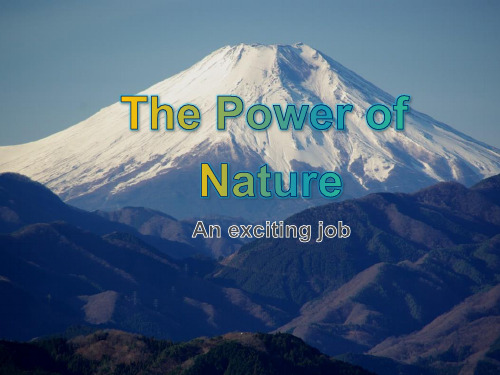
3.What made the author realize that an eruption occurred? 1) my bed began shaking 2) a strange sound 3) my bedroom became as bright as day 4) an absolutely fantastic sight 5) red hot lava was fountaining hundreds of metres into the air
What does the author do
What' s the author' s job about
He is a volcanologist working for the Hawaiian Volcano Observatory.
1.colecting information for a database about Mount Kilauea. 2.evaluting the information. 3.helping other scientists to predict where lava from the volcano will flow next and how fast.
4.Why did the scientists have to get close to the volcano after it began erupting? The scientists needed to get samples of the lava so that they could study them. 5.What does the writer find impressive about volcanoes even after studying them for many years? The writer finds their beauty and their potential to cause great damage very impressive.
M6U5-READING-the-power-of-nature
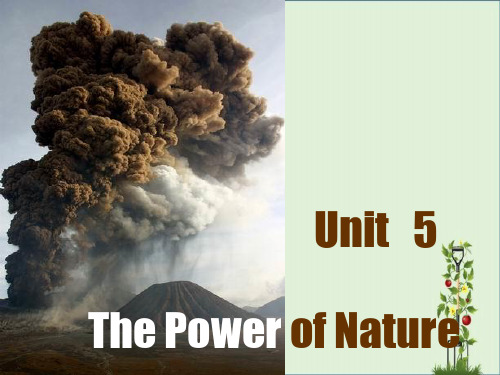
Do you want to be a volcanologist?
What might be talked about?
An Exciting Job
Working as a volcanologist.
The author is impressed by the beauty of the eruption and also by its potential to cause great damage.
Thinking
How does the writer think about his job? Why?
Read again and try to find out main ideas of each part.
Part 1(Para 1-2)
The writer’s experience of watching the volcanic eruption
Part 2(Para 3-4) The writer’s job and its
Part two (Para. 3- Para. 4)
The lava can cover up or burn villages in its path. The rocks from the volcano usually don’t damage anything because no one lives near the crater.
Part two (Para. 3- Para. 4)
3. What does the writer mean by using “lucky” in the sentence “I was lucky enough to have a much closer look at it.”?
新人教选修六 Unit 5 The power of nature-Reading[阅读课件]
![新人教选修六 Unit 5 The power of nature-Reading[阅读课件]](https://img.taocdn.com/s3/m/4ca40f1ea8114431b90dd8a8.png)
A. He travels to unusual places and meets interesting people from all over the world B. He likes the different ways of working C. He thinks his job the most important D. He is excited about dangers and feels alive
6. What does the word “alive” mean in the sentence “... danger excites me and makes me feel alive”? A.Living or not dead. B. Active or lively. C. Continuing. D. Healthy.
7.What does the writer find impressive about volcanoes even after studying them for many years? The writer finds their beauty and their potential to cause great damage very impressive.
Homework
Spend some time researching one disaster. You can use books, magazines, newspapers or the Internet. Collect pictures or diagrams and look for information about:
高中英语(人教版)选修六Unit 5 The power of nature-reading课件(共16张)

(Para 1-2)
of watching the volcanic eruption
Part 2 (Para 3-4)
Part3 (Para 5)
The reasons for the writer’s enthusiasm about his job
The writer’s job and its importance.
Do you think volcanologist is an occupation you would enjoy? Give your reasons
Task 3 Let’s fill in the blanks according
to the text!
I’m a volcanologist. I travel to unusual places and meet inbtoerreedsting peoHpalveinfgromcolalellctoevder the world. I’m never _______(bore). _____________(collect) and evaluated the informatioUnnfoofrtvuonlcaatenloes, I help other scientists to predicyt where lava will flow next and hhoawvefabsete. n__c_o_v__e_r(efdortunate), we can’t move people’s homes out of the ewrauyp,taionnd many houwsheisc_h____________(cover)with lava or burned to
Tornado
选修六Unit5 The power of nature——大自然的力量
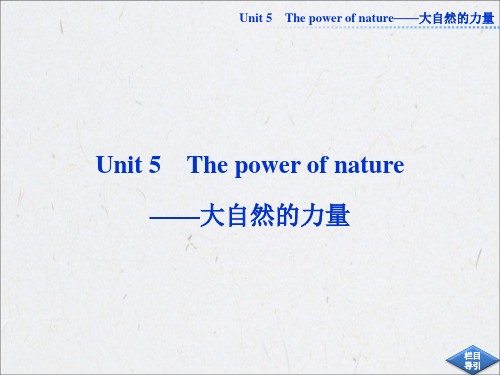
The power of nature——大自然的力量
Unit 5
The power of nature
——大自然的力量
栏目 导引
Unit 5
The power of nature——大自然的力量
基础盘点自测自评
核心单词 1.When the train began to move quickly,Helen excitedly ____________(挥手)at her friends on waved the platform.
高频短语 1.________________ make one’s way 前往
2.________________ 匆匆看一遍 glance through vary from...to... 3.________________
不等 give birth to 4.________________ 生产;产生 5.___________________ 与„„相比 be compared with...
栏目 导引
由„„到„„
Unit 5
The power of nature——大自然的力量
protect...from... 6.________________ „„伤害
保护„„免受
be appointed as... 7.________________ 被委派为„„ burn to the ground 8.________________ 全部焚毁 be about to do sth. 9.________________ 马上就要做某事 refer to 10.________________ 查阅,参考, 指的是
栏目 导引
(完整word版)高中英语人教版选修6Unit5thepowerofnaturereading教案(系列五)(word文档良心出品)
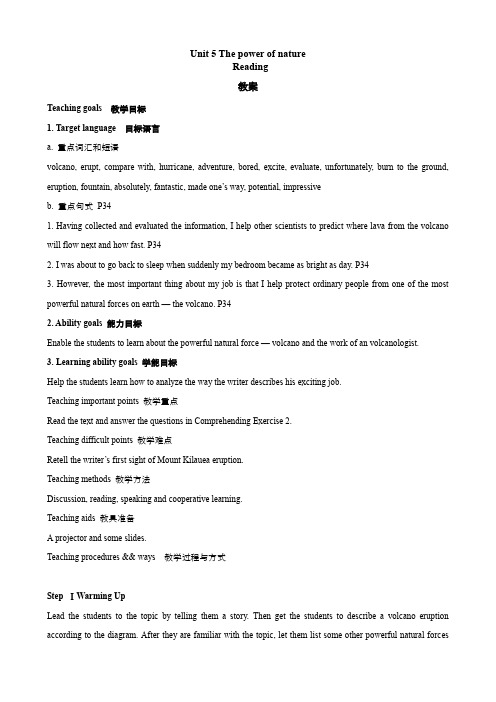
Unit 5 The power of natureReading教案Teaching goals 教学目标1. Target language 目标语言a. 重点词汇和短语volcano, erupt, compare with, hurricane, adventure, bored, excite, evaluate, unfortunately, burn to the ground, eruption, fountain, absolutely, fantastic, made one’s way, potential, impressiveb. 重点句式P341. Having collected and evaluated the information, I help other scientists to predict where lava from the volcano will flow next and how fast. P342. I was about to go back to sleep when suddenly my bedroom became as bright as day. P343. However, the most important thing about my job is that I help protect ordinary people from one of the most powerful natural forces on earth — the volcano. P342. Ability goals 能力目标Enable the students to learn about the powerful natural force — volcano and the work of an volcanologist.3. Learning ability goals 学能目标Help the students learn how to analyze the way the writer describes his exciting job.Teaching important points 教学重点Read the text and answer the questions in Comprehending Exercise 2.Teaching difficult points 教学难点Retell the writer’s first sight of Mount Kilauea eruption.Teaching methods 教学方法Discussion, reading, speaking and cooperative learning.Teaching aids 教具准备A projector and some slides.Teaching procedures && ways 教学过程与方式Step ⅠWarming UpLead the students to the topic by telling them a story. Then get the students to describe a volcano eruption according to the diagram. After they are familiar with the topic, let them list some other powerful natural forcesand discuss the ways human beings protect themselves from the natural forces.T: Listen to me carefully. I will tell you a story about a strange city. The strange city named Pompeii is a dead city. No one has lived there for nearly two thousand years, yet every year thousands of people travel from distant countries to visit it. It died suddenly in a terrible rain of fire and ash. Tons of hot ash fell on Pompeii, hiding it from sight. For three days the sun didn’t break through the clouds of ash in the sk y. Then the whole city shook and buildings fell down. When everything was calm, Pompeii was buried deep. A city disappeared and people there lost their lives too. Can you guess what had happened to the city?S1: There must have been a terrible earthquake. After the terrible quake, everything was destroyed.T: Yes. It’s one kind of the causes. Any different ideas?S2: Maybe a volcano erupted and a terrible rain of fire and ash fell on the city.T: You got it! Mount Vesuvius, which had slept quietly for centuries, erupted suddenly. It destroyed the city Pompeii. How terrible! Have you ever seen a volcano erupting? Please turn to page 33. Look at the diagram. Describe a volcano erupting using the diagram and the given words.S3: When boiling rock erupts from the volcano, the red hot lava rushes hundreds of metres into the air and a cloud of ash goes straight up into the air. Ash cloud forms. Rocks, fire, ash fall onto the ground. The lava flows slowly down the mountain. It buries everything in its path under the molten rock.S4: Sometimes, volcano erupting can cause some other disasters like earthquakes, fire and ground sea.T: How powerful the nature is! The lava can buries everything in its path. A volcano erupting can damage a city. A flood can carry everything in its path, while a fire will damage everything it meets. It seems that we human beings are powerless in front of these natural forces. What can we do to protect ourselves from powerful natural forces? Please work in groups of four to list some other natural forces and discuss the ways that human beings protect ourselves.A few minutes later.T: Who would like to share your opinion with the class?S5: I’d like to talk about volcano. Sometimes, the volcano gives warnings in the form of many small earthq uakes. And scientists can provide warnings of possible volcano explosions with the help of equipment. So the government can help people who live near the volcano leave their homes before erupting.S6: We are more familiar with fire. In fact, it can be avoided most of the time, if we are careful in our daily life. I know a way of controlling the fire. Firefighters burn the trees which are in the path of the fire, so there is nothing to burn when the fire arrives.S7: Flood always happens in the south of our country. Predication is very important. Scientist keep observing thelevel of the water during the summer. People strengthen the bank and move to higher land.S8: We have learned more about earthquakes. People have learned many ways to protect themselves. For example, earthquake happens, if you are in bed, stay where you are and protect your head with a pillow. If you are outdoors, find a clear spot away from buildings, trees and streetlights.S9: I think the best way is to move to a safer place where fire, earthquake, flood and hurricane will never happen.Step ⅡPre-readingGet the students to answer the six questions on page 33 to find out whether they will enjoy working as a volcanologist. And then get them to talk about the occupation according to the questions.T: I see. Prediction is very important. We can say scientists play an important part in protecting people from natural forces. Would you like to study volcanoes? And do you want to be a volcanologist?Ss: Yes.T: Let’s test whether you are suitable for this job or not. Answer “yes” or “no” to these que stions on page 33.The students answer the questions to see if they are suitable to be a volcanologist.T: Are you suitable for the job? Who can tell us what kind of person can be a volcanologist?S1: First he must be brave enough because he must climb into a live volcano to take the temperature of the boiling rock inside.S2: I think interest is the most important. He should show great interest in studying rocks and volcanoes.S3: He should be interested in travelling to unusual places and like adventure in his life.S4: If you want to be a volcanologist, you should enjoy working outside because a lot of work need to be done outdoors.Step ⅢWhile-readingScanningGet the students to read the passage quickly and accurately. Give them a couple of minutes to look through the whole passage. Tell them to read the text silently and then ask them some detailed questions about the text.T: What do es a volcanologist do? Is the work interesting? Let’s read a passage written by a volcanologist. The volcanologist enjoys his job very much. He described his exciting job. And he wrote down his first sight of an eruption. Now let’s read the text quickly an d find out the answers to these questions Comprehending Exercise 1 on page 35 .Several minutes later.Check the answer..SkimmingIn this part, the students will read the text quickly to get the general idea of the passage. Check the answers with the whole class, then explain some sentences or words that the students may find hard to understand.T: Now please read the text again and try to get the main idea of the passage in groups of four.Three or four minutes later.T: Have you got the general idea of the text?It wasn’t very easy to walk in these clothes, and we slowly made our way to the edge of the crater and looked down into the red, boiling center. Though I was a little afraid, I wanted to climb down into the crater to collect some lava. But this being my first experience, I could only stayed at the top and watched the two scientists. At that time I determined to be a volcanologist forever.DiscussionT: In the writer’s opinion, his job is the greatest one. Do you like this occupation? Why or why not? Discuss in groups of four.S2: I would not like to be a volcanologist. I prefer to work in an office to do some research work. It’s a waste of time and energy to spend so much time traveling.S3: I hope to be a vocanologist. You’ll be proud of yourse lf when people escape before volcano erupting because of your work. Also, I am interested in the rocks and other things that make up the surface of the earth. I want to know the secret of the earth.S4: It is not my ideal occupation. I like traveling to unusual places, studying different cultures, talking with interesting people and collecting interesting things. But I’m not brave enough to climb into a live volcano to take the temperature of the boiling rock inside.S5: I don’t like this job. It’s too dang erous. If the volcano erupts suddenly when you are collecting the lava, maybe you will lose your life.T: Well, if you meet the writer, what kind of questions would you ask him?S6: Aren’t you afraid when you walk towards the volcano? It’s so hot and the v olcano may erupt again.S7: What should you do if you get lost on your way to the volcano?S8: When did you begin to be interested in volcanoes?S9: How will you escape if the volcano erupts suddenly?S10: Are there any living things in volcanoes?S11: Why do people live near the volcanoes since they may lose their homes or even lives?Writing characteristicsT: Good! If you are interested in this occupation, you can get more information on the Internet. Now who can summarize the writing style and techniques of this text?The teacher can ask the students to have a discussion in pairs or groups, and then ask some of them to show their ideas.Sample answers:This passage was written by a volcanologist. He uses the first person to describe his exciting job and his experience and express his true love for his job. The words are vivid and the description is natural, which makes the readers feel as if they were watching the volcano eruption and begin to like the occupation. For example, he uses “like a railway train passing outside my window”, “suddenly my bedroom became as bright as day” and “red hot lava was fountaining hundreds of metres into the sky” to describe the big noise and fantastic sight of volcano eruption. To tell readers that his job is intere sting, the writer uses several “sometimes”, which makes the readers feel the job is extremely interesting and want to be a vocanologist. The writer talks about the volcano objectively. He points out the damages of volcano but he praises its fantastic sight at the same time.T: What can we learn from the text?S: The key word of the text is “exciting”, which is the focus of the passage. By telling the readers his everyday work, the importance of his job, his first sight of volcano eruption and his sincere love for his job, the author proves it’s his chief enjoyment to be a volcanologist. And I appreciate the writer’s attitude towards nature. We should love nature and we can do something to minimize the damage caused by natural forces.Step ⅤHomeworkT: No w it’s time for homework. Today you have two tasks to finish after class. The first task is to finish exercises in Discovering useful words and expressions on page 35. These exercises will help you practice the words and expressions we’ve just learned. The second one is to retell the text. That’s all for today. See you tomorrow.。
选修六 Unit 5 The Power of Nature

选修六Unit 5 The Power of NatureReading: An exciting job阅读教学设计设计意图:根据新课标的五个理念,高中英语课程教学强调基础性,包括语言知识和语言技能的基础,也包括情感态度的基础,学习能力和文化意识的基础,为他们以后升学、就业和终身学习创造条件,并使他们具备作为21世纪公民所应具有的基本英语素养。
I.Text Analysis教材分析:本单元中心话题The power of nature,旨在引导学生了解大自然的威力,认识到大自然的伟大力量,认识到只有保护大自然,才能有效地预防自然灾害并改造和利用大自然。
并会用所学词汇描述在经历自然灾害时的感受,思考人类应对自然灾害的态度和方法,提高自我保护意识。
Reading部分是一位火山学家的自述。
通过对火山学家工作内容和重要性的介绍,以及自己第一次目睹火山爆发的经历描述,表述了作者对自己工作的热情。
在从事这项工作20年后,尽管充满危险,火山对他的吸引力依然不减。
阅读这篇文章,能很好地激发学生对自然力量的敬畏和好奇,并点燃他们对科学探索工作的兴趣和热情。
Ⅱ. Teaching goals教学目标高中阶段的总目标是使学生在义务阶段英语学习的基础上,进一步明确英语学习目的,发展自主学习和合作学习;形成有效的学习策略;发展综合运用语言的能力。
据此设计教学目标如下:1.Knowledge goals知识目标:To enable the students to learn about the powerful natural force —volcano eruption and the work of a volcanologist.了解火山爆发的过程和火山学家的工作。
2.Ability goals 能力目标:To develop students’ four basic reading skills.(skimming, scanning and induction)培养学生的三种基本阅读技巧。
人教版高中英语选修六第五单元ThePowerofNature

人教版高中英语选修六第五单元ThePowerofNatureUnit 5 The Power of Nature 第一课时Learning aims: 1. to get the students to master all the useful words and expressions in this unit.2. to develop the students’ ability of using the important language points. Important and difficult points: using what they have learned to solve real problems.预习案Vocabulary1. __________ n. 图表;图表:示意图2. _____________ n. 调查问卷3.__________ n. 火山_________ adj. 火山的4. ________ vi. (火山)爆发; 突然发生; ____________n.5.___________ n. 飓风; _________ n. 龙卷风; __________ n. 台风.6. ____________adv. 在旁边; prep. 在...旁边; beside _______________; aside _______________7. _____________ n. 设备, 装备; __________ v. 装备; equip sth/sb with sth ____________________8. ____________ v. 任命, 委派; ______________ n. 预约,约会; 任命, 委任9. __________ v. 评价, 评估; ____________ n 评估, 评价; assess _________; ___________ n.10. __________ adj. 绝对的; 完全的; __________ adv.; thorough __________; complete ___________11. ___________ n. 潜能; 可能性; adj.可能的, 潜在的;12. ___________ adj.实际的; 实际地: ___________; ___________; ___________; ________________13. ___________ adj. 贵重的,珍贵的; treasured adj. _________________14. _________ n. 小说; adj. 新颖的; ___________ n小说家15. ____________ n. 文件, 证件; documentary n. _______________; adj. _________________16. ______________adj. 有知觉的, 有意识的; _______________ adj. 失去知觉的; 未察觉的17. ____________ ( _________, _________) vt. 射中; 射伤; ____________ n. 射击, 枪炮声18. ____________ vi. 摇晃; 颤抖; tremble with fear ________________; trembling ______________19. __________ n. 汗vi. 出汗sweaty ___________; sweater ____________ perspiration___________20. __________ adj. 忧虑的,不安的____________ n. 担心, 焦虑, 渴望21. _________ (__________,__________)v. 惊慌; n. 惊慌, 恐慌22. _____________ vt. 保证, 担保; n. 保证, 担保assure _________; assurance __________探究案1.equipment n. ____________ equip v. 过去式________; 过去分词_________1.Our school has just introduced a piece of advanced equipment.2.Our school has just been equipped with a piece of advanced equipment.3.The centre is well equipped for canoeing and mountaineering.4.He equipped himself with a first-aid kit in case of emergency.5.The course is designed to equip students for a career in nursing.总结:①②③④2.appoint v. ___________ appointment n. ____________(课文原句) I was appointed as a volcanologist working for the Hawaiian V olcano Observatory (HVO) twenty years ago. 二十年前我被任命为火山学家,在夏威夷火山观测站工作。
高中英语(人教版)选修六Unit 5 The power of nature-reading课件(53张PPT)
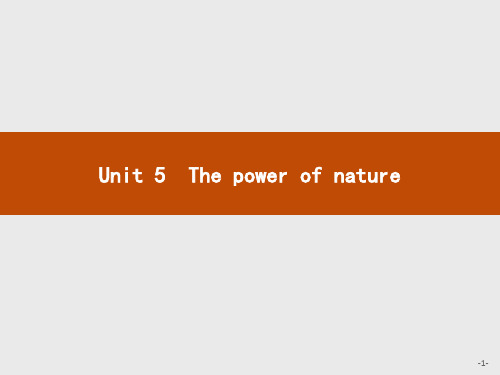
natural forces.
-9-
Section Ⅰ— Warming Up, Pre-reading, Reading & Comprehending
晨读晚诵
预习导引
核心归纳
一二三四五
二、将下列单词与对应的释义搭配起来
A
B
1.alongside plete,thorough
2.absolute b.to choose sb.for a job or position of responsibility
晨读晚诵
预习导引
核心归纳
一二三四五
3.How many years has the author worked as a volcanologist?
A.10 years. B.20 years.
C.30 years. D.40 years. 答案:B
4.Where is Mount Kilauea?
Unit 5 The power of nature
-1-
Section Ⅰ— Warming Up, Pre-reading, Reading & Comprehending
单词注释 难句剖析 导读诱思
晨读晚诵
预习导引
核心归纳
Kilauea’s History 夏威夷的基拉韦厄火山(Mount Kilauea)是世界上最活跃的火山 之一,至今仍经常喷发。古夏威夷人把它看作是火山神“派丽”愤怒 和痛苦的象征。下面让我们一起来了解一下吧!
D.Earthquake.
答案:A
-13-
Section Ⅰ— Warming Up, Pre-reading, Reading & Comprehending
高中英语(人教版)选修六Unit 5 The power of nature-reading课件(共17张PPT)

3. What is the most popular tourist attraction in the reserve?
The answer: Tianchi or the Lake of Heaven.
4. What does Tianchi meanding
㈠Glance through these questions. Then skim this
passage about a tourist attraction in China and answer the questions. 1. In what province is Changbaishan? 2. What is a nature reserve? Why is Changbaishan a famous nature reserve? 3. What is the most popular tourist attraction in the reserve? 4. What does Tianchi mean? How was Tianchi formed? 5. What is the connection between the Manchu people and Tianchi?
Don’t forget to make a _w__is_h__ to g__u_a_ra__n_te_e_ your love will be as deep and l_a_s_t_in_g_ as the lake itself.
Ⅲ. Performance
★Perform the story about the father of the Manchu Role A: the first young woman Role B: the second young woman Role C: the youngest girl Role D: a bird Rold E: a handsome boy(the father of the Manchu people)
人教版高中英语选修6-Unit5-The-power-of-naturereading课件41张
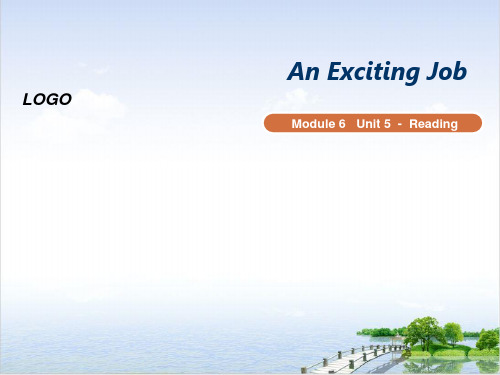
A powerful earthquake struck Haiti’s capital,_____ tens of thousands homeless and buried in ruins.
Why? If not, what would you like to do? Dina,________for months to find a job as a waitress,finally took a position at a local advertising agency.
He has a fountain of ideas about what to write. ________ the right kind of training,these teenager soccer players may one day grow into international stars. The potential market of baby products is large. 精编优质课PPT人教版高中英语选修6-Unit5-The-power-of-nature reading 课件 (共41张PPT)(获奖课件推荐下载) Key words II
How? Be driven up the mountain and dropped
Put on special clothes What? ExMCclaiitmdinebgeo,dufardnwotwaasynt;iaclon;odfkeceeodll;ldehocewtarn;;see
精编优质课PPT人教版高中英语选修6- Unit5- The-po wer-of -natur e reading 课件 (共41张PPT)(获奖课件推荐下载)
人教版英语选修六Unit5 the power of nature(Reading)公开课课件%28共30张PPT%29
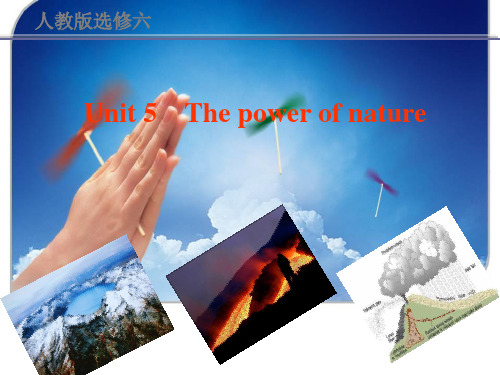
2.What did the author do after he was appointed
as a volcanologist?
B
A.He collected information about Mount Kilauea
on the spot.
B.He analyzed the data and predicted where the
Part two (Para. 3- Para2. 4.W ) hat made the author realize that an eruption occurred?
My bed began shaking
A strange sound
My bed room became as bright as day
• What do you know about volcano? • Do you know how a volcano erupts? 2. Let’s watch the video and write down the key words about the volcano.
Boiling rock erupts from the crater (火山口); the lava(熔岩) flows slowly
much closer look at it’?
D
A. He felt much safer on the top while the other
two scientists climbed down into the crater.
B. It was his first sight of an eruption.
D. Because he wanted to collect information about eruption.
Unit5Thepowerofnature-Reading课件(人教选修6)

Skimming
Skim the text and answer the following questions.
1. What is the writer?
He is a volcanologist working for the Hawaiian Volcano Observatory. He mainly collects information about Mount Kilauea.
Detailed reading
Read the text more carefully and answer the following questions.
1. What made the author realize that
an eruption occurred ?
●my bed began shaking ●a strange sound ●My bedroom became as bright as day ●an absolutely fantastic sight ●red hot lava was fountaining hundreds of meters into the air
3. What was he wearing when getting close to the crater? And what was the result?
He was wearing white protective suits that covered his whole body, helmets, big boots and special gloves, just like a spaceman. As a result, it made him difficult to walk.
新人教版选修六unit5《the power of nature》优秀教案1(重点资料).doc
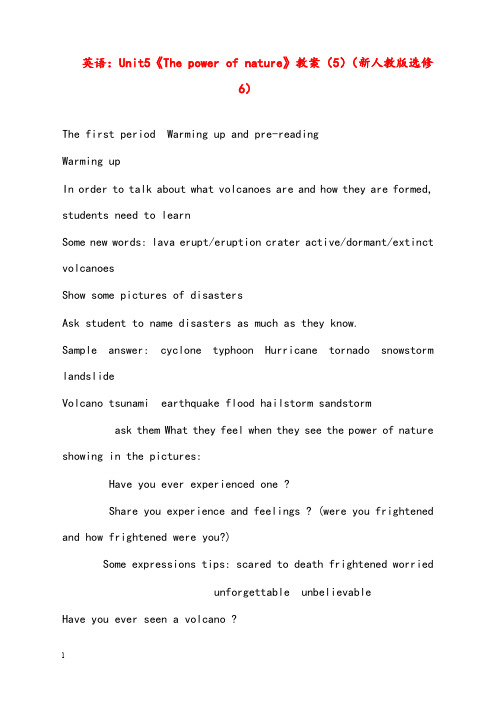
英语:Unit5《The power of nature》教案(5)(新人教版选修6)The first period Warming up and pre-readingWarming upIn order to talk about what volcanoes are and how they are formed, students need to learnSome new words: lava erupt/eruption crater active/dormant/extinct volcanoesShow some pictures of disastersAsk student to name disasters as much as they know.Sample answer: cyclone typhoon Hurricane tornado snowstorm landslideVolcano tsunami earthquake flood hailstorm sandstormask them What they feel when they see the power of nature showing in the pictures:Have you ever experienced one ?Share you experience and feelings ? (were you frightened and how frightened were you?)Some expressions tips: scared to death frightened worried unforgettable unbelievableHave you ever seen a volcano ?Ask Ss to complete exercise 1 in groups. Then check their answers orally as a whole class.Ask students to help you make a list of words connected with volcanoesDiscuss with students where in the world active and extinct volcanoes occur.2. pre-reading1) Can you tell me who will climb into a live volcano in order to take the temperatureof the boiling rock inside ?volcanologists——do they take up a crazy job?get the students to answer the six questions in pre-reading to find out whether they willenjoy working as a volcanologist.Students could do this activity as a survey by asking others in their class these questionsOr they could do it individually.after they have completed the task, survey the class to find out how many might enjoythe work of a volcanologist.their guesses were.The second period Reading and comprehending1.First readingSkinning & skimming1)Ask students to read through the passage quickly to get a main idea ofthe whole passage. Give them a limited time to read the whole passage in order to encourage them to practice reading for general ideas and todiscourage them from reading word by wordmain idea: This passage is a first-person account of a volcanologist’s experiences. The volcanologist described his exciting job and wrote down his first sight of an eruption. What does a volcanologist do ?( answer in the text )Then let students do the multiple-choices (见课件)2)Set Exercise 1 in “comprehending”either as a group or whole-class activity. Explain to students that the purpose of questions like these is to help them develop skills of evaluatinga text.2.Second reading (intensive reading)Before reading, glance through Exercise 2 on Page35.Choose some to ask them and check their answers:1). Why is a volcanologist’s job important ?Volcanologists study volcanoes so that they can warn people whenthe volcanois going to erupt and so save many lives.2). Why is the lava that flows on Mount Kilauea more dangerous than the actualeruption ?The lava flows down the mountain and can cover up or burn villages in its path. the rocks that erupt from the volcano usually don’t damage anything because no one lives the crater.3). Why was it difficult for the writer to walk towards the edge of the crater ?The author was wearing special protective clothing that made it difficultto walk4). What does the writer find impressive about volcanoes even after studying them for 20 years ?The author is impressed by the beauty of the eruption and also by its potential to cause great destruction.3.Third reading (Read again to find more details)1).what made the author realize that an eruption occurred ?answer: my bed began shakinga strange soundmy bedroom became as bright as dayan abosolutely fantastic sightred hot lava was fountaining hundreds of metres into the air2).what did the scientists do after the eruption ?answer: put on white protective suits, helmets, big boots dropped as closed as possible to the craterslowly make our way to the edge of the craterlooked down into the red boiling centerHomeworkSpend some time researching one disaster. You can use books, magazines, newspapersor the Internet. Collect pictures and diagram and look for information about:• what causes this kind of disaster• actrual events that happened in the past in china and/or the rest of the world• how people helped the victims• what is being done to prevent the disarster happening again or to lessen the damage。
高中英语选修 The power of natureReading人教新课标

教案2人教选修6 Unit 5The power of natureReadingTeaching material:NSEFC Book 6 —— Unit 5Teaching AimsEnable the students to grasp and remember the detailed information of the reading material.Teaching Important & Difficult PointsHow to help the students to grasp and remember the detailed information of the reading material.Teaching aids:a tape recorder, a projector, slides and picturesTeaching ProcedureStep1Pre—reading1.Can you imagine climbing into an active volcano to take the temperature of the boiling rock inside?2.To be a volcanologist, what qualities are needed?Step 2QuizAre you suitable for being a volcanologist?What kind of work do you think a volcanologist do?Step 3SkimmingSkim the text and answer the following questions.1.What is the writer?He is a volcanologist working for the Hawaiian Volcano Observatory. He mainly collects information about Mount Kilauea.2.When did he first see an eruption?How did it look like?It was in the second week after he arrived in Hawaii. It was very bright although it was night. Red lava fountained hundreds of meters into the air and it was a fantastic sight.3.What was he wearing when getting close to the crater?And what was the result?He was wearing white protective suits that covered his whole body, helmets, big boots and special gloves, just like a spaceman. As a result, it made him difficult to walk.Step 4ScanningScan the text and answer the following questions.1.Why is a volcanologist’s job important?Volcanologists study volcanoes so that they can warn people when the volcano is going to erupt and so save many lives.2.Why is the lava that flows on Mount Kilauea more dangerous than the actual eruption?The lava flows down the mountain and can cover up or burn villages in its path. The rocks that erupt from the volcano usually don’t damage anything because no one lives near the crater.3.Why did the scientists have to get close to the volcano after it began erupting?The scientists needed to get samples of the lava so they could study them.4.What does the writer find impressive about volcanoes even after studying them for 20 years?The author is impressed by the beauty of the eruption and also by its potential to cause great destruction.Step 5Detailed readingRead the text more carefully and answer the following questions.1.What made the author realize that an eruption occurred?my bed began shakinga strange soundMy bedroom became as bright as dayan absolutely fantastic sightred hot lava was fountaining hundreds of meters into the air2.What did the scientists do after the eruption?put on white protective suits, helmets, big bootsdropped as closed as possible to the craterslowly make our way to the edge of the craterlooked down into the red boiling centerStep 6 Homework1.Find out words, expressions and sentences which you think are useful, important or difficult to understanD.2.Finish exercises in Learning about Language. (Ex. 1, 2)。
- 1、下载文档前请自行甄别文档内容的完整性,平台不提供额外的编辑、内容补充、找答案等附加服务。
- 2、"仅部分预览"的文档,不可在线预览部分如存在完整性等问题,可反馈申请退款(可完整预览的文档不适用该条件!)。
- 3、如文档侵犯您的权益,请联系客服反馈,我们会尽快为您处理(人工客服工作时间:9:00-18:30)。
Part two (Para. 3- Para. 4)
3. What does the writer mean by using “lucky” in the sentence “I was lucky enough to have a much closer look at it.”? •It was his first sight of an eruption. •It was the first time for him to watch the crater. 4. Why did the scientists have to get close to the volcano after it began erupting? To get some lava for later study.
earthquake
flood
drought
thunder/ lightning
hurricane /typhoon
tornado
tsunami
volcano-eruption
• What do you know about volcano? • Do you know how a volcano erupts?
His work can help save many lives because people in the path of the lava can be warned to leave their
houses.
Read again and try to find out main ideas of each part.
put on white protective suits, helmets, big boots dropped as closed as possible to the crater
slowly make our way to the edge of the crater
looked down into the red boiling center
1. Why is the lava that flows on Mount Kilauea more dangerous than the actual eruption? 2. What made the author realize that an eruption occurred? 3. What did the scientists do after the eruption ?
Part 1(Para 1-2)
The writer’s experience of watching the volcanic eruption The writer’s job and its importance The reasons for the writer’s enthusiasm about his job
Part three (Para. 5)
What does the writer find impressive even after studying volcanoes for more than twenty years?
The author is impressed by the beauty of
Unit 5 The Power of Nature
• In February, 2008, what happened to China?
snowstorm
• Do you know any other natural disasters ? Please work with your partners and make a list of natural disasters .
Part 2(Para 3-4)
Part 3(Para 5)
Part one (Para. 1- Para. 2)
1)Why is a volcanologist’s job important?
It can help protect ordinary people from one of the most powerful forces on earth—the volcano.
2) Where is Mount Kilauea?
In Hawaii.
3) The writer doesn't mind the occasional danger of his job because
danger excites him and makes him feel alive _____________________________.
What made the author realize that an eruption occurred ?
Hale Waihona Puke my bed began shaking
a strange sound
The light was caused by the red-hot rocks and gas that erupted from the volcano.
An extinct volcano An active volcano A dormant volcano
Who will climb into a live volcano to take the temperature of the boiling rock inside?
What kind of things might a volcanologist do?
the eruption and also by its potential to cause great damage.
Do you think it is an occupation you would enjoy? Discuss your reasons with your classmates.
The rocks under the earth become hotter and hotter and erupt from the mountain.
2.Where is most possible for a volcano to erupt?
Near the oceans.
3. What types of volcanoes do you know?
Part two (Para. 3- Para. 4)
The lava can cover up or burn villages in its path. The rocks from the volcano usually don’t damage anything because no one lives near the crater.
Ash cloud Crater
volcanoeruption
Boiling rock erupts from the crater; The lava flows slowly down the mountain.
Lava
Magma chamber
More about the volcano
1. How is a volcano formed?
Collect and evaluate information about volcanoes.
What might be talked about?
An Exciting Job
Working as a volcanologist.
What does a volcanologist do? Is the work important?
My bedroom became as bright as day red hot lava was fountaining hundred of metres into the air an abosolutely fantastic sight
What did the scientists do after the eruption ?
